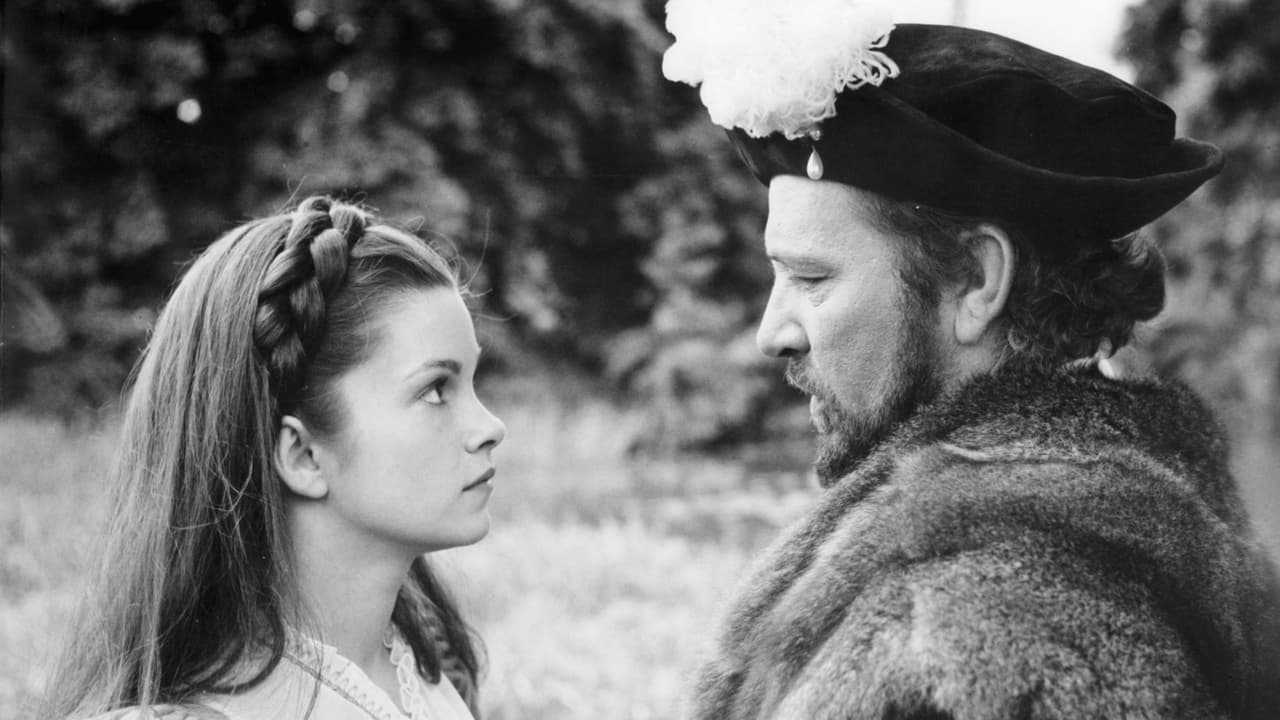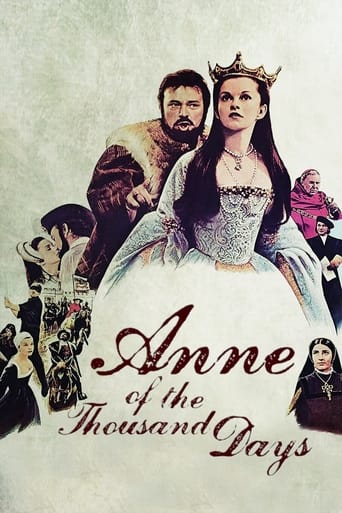

Tied for the best movie I have ever seen
... View MorePeople are voting emotionally.
... View MoreAll of these films share one commonality, that being a kind of emotional center that humanizes a cast of monsters.
... View MoreThe movie's not perfect, but it sticks the landing of its message. It was engaging - thrilling at times - and I personally thought it was a great time.
... View MoreI would probably rate this between a 6 or a 7, at a 6.6 but since I this site has whole numbers only, I've gone with the 6. I love Tudor history and am interested in the different portrayals of Anne Boleyn. Was she ambitious, deductive, a victim? I enjoyed this portrayal as it seemed to have different nuances to it than many of the others. It is one of the few I have seen where Anne appears, at least for a while, genuinely young, and I mean that not in age so much as her emotional sophistication. They show her going through a progression before she gets to the state that we see her depicted as more often-ambitious and manipulating. I also enjoyed the costumes and sets, which seemed more authentic than many of the modern productions, with actual castles and landscaping. There were some minor historic errors, such as Mary Tudor being at her mother's death bead, something which I believe Henry denied her in real life. but I am not bothered by such minor dramatic changes.The main problem with the film was that it was very one dimensional and linear, with very basic writing. That made it seem a bit long, and not long in a good, "epic" kind of way. They didn't elaborate on the historical forces at work or the real emotional complexities of the characters. While I often prefer simple movies to those that are too convoluted, this film presented as just a re-telling of the occurrences. It didn't feel very compelling to me, and given the historical events, it really should have been.Worth seeing if you enjoy history or costume drama, but not emotionally rich or compelling.
... View MoreThe Tudors have spawned a lot of movies over the years. Perhaps surprisingly, most of them (at least the ones I've seen, and I've seen a few) have been pretty good ones. "Anne Of The Thousand Days" is no exception to that rule. With a great cast and lavish sets, this manages to tell the story of the relationship between King Henry VIII and Anne Boleyn - apparently destined against her will to be the King's mistress, but then, at her demand, and given no choice in the matter, the instigator of both political and religious turmoil as she demands to be not the King's mistress, but the King's wife - and Queen of England - a goal stymied by the fact of the King's marriage to Catherine of Aragon.As Henry and Anne, Richard Burton and Genevieve Bujold put on excellent performances, and the supporting cast was also quite strong. Neither Henry nor Anne were truly vilified; neither were they made heroes. Henry was portrayed as a King overcome repeatedly by lust (the cycle emphasized near the end of the movie with the appearance of Jane Seymour at court while Anne watched at a dinner very reminiscent of the dinner at which Anne appeared at court while Catherine watched.) Henry will manipulate and threaten and do whatever it takes to satisfy his lust. Yet, one gets the impression that - while consumed by lust - Henry does have a sincere concern about the need for a male heir and a belief that England won't allow itself to be ruled by a Queen. He's also clearly portrayed as concerned by his split with the Church, although at the same time one sees that he believes his prerogatives as King take priority over the concerns of the Church or even of God, summed up by his comment that "when the King prays, God answers." Anne on the other hand is a figure of some sympathy. In this movie at least she didn't ask to get mixed up in royal politics; she was the unwilling attention of Henry's lust. Yet, once her destiny was sealed, she also is clearly manipulative, grasping after what she wants, determined to get as much as she can from the King. The politics of the court are well portrayed, and most of what we see is accurate to the historical record, although the movie chooses to end on an obviously anachronistic note, with looks ahead to the glorious coming reign of Anne's daughter, who would defy her father's belief that a Queen couldn't rule England by becoming the magnificent figure of Queen Elizabeth I. This is a worthy piece of the Tudor movie collection. (7/10)
... View MoreThe young King Henry the Eighth(Richard Burton)is tired of his first wife Queen Catherine(Irene Papas) after she fails to bear him a son and heir(she does give birth to some but they die)she has only gave him a daughter the Princess Mary.Henry's eye is caught by the young and beautiful Anne Boleyn(Genevieve Bujold)who is a member of the court.He woos her(much to Annes annoyance)till she eventually falls in love with him.Well as anyone who has studied Tudor history knows their marriage was not a happy one.Anne promises the King to give birth to many fine sons but sadly hers die also.She gives birth to the Princess Elizabeth but Henry only wants a son and is already looking out for another wife.By then Annes fate is sealed and through the cruelty of Thomas Cromwell(John Colicos)she is doomed to meet her tragic end in The Tower of London. Genevieve is the perfect combination of strength,dignity and vulnerability as Queen Anne and Richard Burton is an intense and torn Henry great acting,sets,locations and costumes this is a must see.
... View MoreWOW! Now I can understand Shakespeare perfectly. It wasn't so much that he was a genius, just look at the fodder he had all around him, all he needed do was to simply put pen to paper and the stories just oozed out, LOL, on their own. I wonder just how true these stories are to fact? This story had me shaking my head in disbelief; the deception, the treachery, the pomposity, the buggery, those horny monarchs, lol. It is beyond incredible that for mere want of a male heir, or even worse, to simply fulfill some base carnal desire, much like an animal, a "King" would stoop to such skulduggery. It seems that every film I've yet to see of this genre, all suffer similar outcomes, so I guess I've answered my own question, there must be some basis of truth to all these stories. Boy, that must have been some scary times to be alive, or worse yet to be born into nobility and have to deal with all those idiots and all the backstabbing just for the sake of paying homage to the "boss", LOL...I guess the film left an impression...
... View More